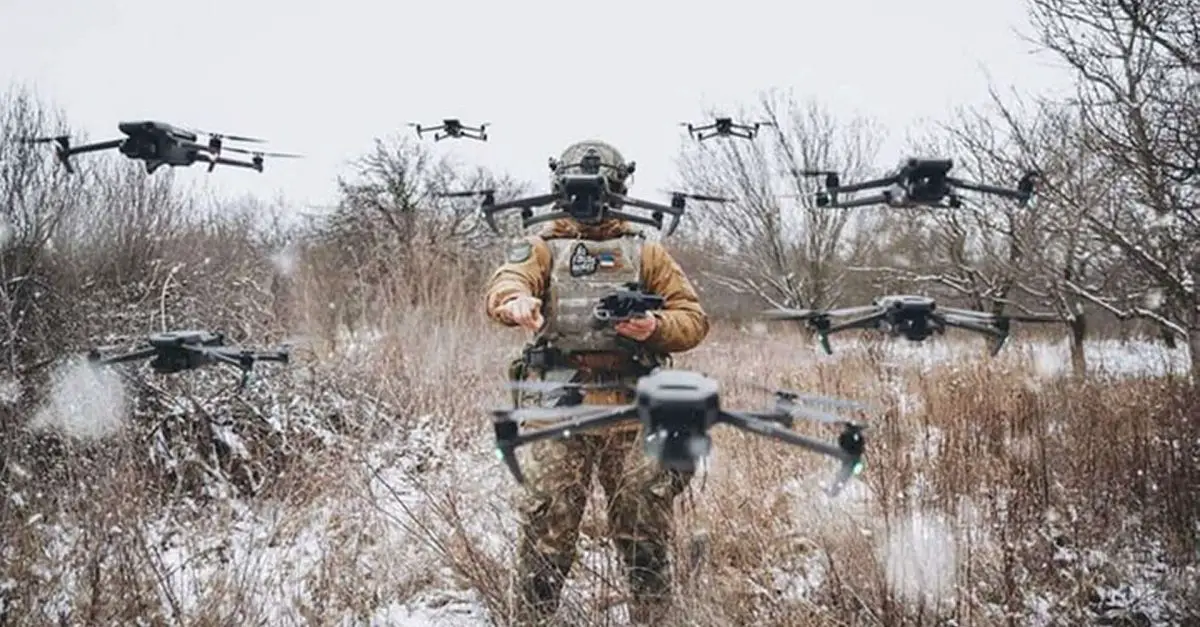Breaking news
Germany seeks to establish a drone army inspired by Ukraine's combat experience.
On May 14, 2024, during a session of the German Bundestag, the CDU/CSU parliamentary group advocated for the establishment of a dedicated drone branch within the German Army. In their proposal, the CDU/CSU calls on the federal government to create a drone army tailored to the needs of the air force, land forces, and navy, considering both strategic and tactical impacts.
Follow Army Recognition on Google News at this link

The prominence of drones has led to significant organizational changes within the Ukrainian military, as these UAVs are cheaper and easier to deploy than ever before, with Ukraine reportedly using up to 10,000 drones monthly. (Picture source: Ukrainian MoD)
This proposed drone army would draw on the experiences of the Ukrainian armed forces, ensuring sufficient drones for reconnaissance and combat, and include specialists for defending against drones and drone swarms. The proposal states that over two years into the conflict between Ukraine and Russia, the war has significantly changed both offensive and defensive military strategies. Civilian and dual-use technologies, particularly drones of various sizes and their combination with Artificial Intelligence (AI), are playing an increasingly pivotal role on the battlefield.
The CDU/CSU points out that the conflict has revealed the challenge of maneuvering large mechanized formations due to the omnipresence of drones. Hundreds, even thousands, of drones in the sky at any given time track, observe, and counteract movements, making traditional offensive operations exceedingly difficult. This has been observed in both the Ukrainian counteroffensive in the summer of 2023 and recent Russian attempts to advance, where attacks were quickly halted due to immediate counteractions facilitated by drones.
The prominence of drones has led to significant organizational changes within the Ukrainian military, which now has dedicated drone units. These unmanned aerial vehicles (UAVs) are cheaper and easier to deploy than ever before, with Ukraine reportedly using up to 10,000 drones monthly. AI-enhanced drone swarms, capable of autonomously classifying, recognizing, and attacking targets, represent the next stage of development, despite current limitations due to sensor performance and data transmission rates.
Chancellor Olaf Scholz stressed the need to counter Russia's capabilities in his Zeitenwende speech on February 27, 2022. Both Defense Minister Boris Pistorius and Chief of Staff Carsten Breuer have stated that Germany must become war-capable within five years, given the Kremlin's open expression of imperial ambitions. Experts predict that within five to eight years, Russia could conventionally challenge NATO. The CDU/CSU asserts that the federal government has inadequately responded to these changes, noting that Chancellor Scholz's directive to develop capabilities against the Russian threat has not been effectively implemented in the realm of military drones and their defense.
The CDU/CSU's proposal includes several key measures. Firstly, the parliamentary group proposes that every combat military unit from platoon strength upwards should be capable of combating drones, with supporting forces equipped accordingly. They also call for the establishment of a new branch within the Bundeswehr dedicated to unmanned systems and drone defense. This "drone army" would be cross-dimensional, involving the air force, land forces, and navy, and modeled after the experiences of the Ukrainian armed forces.
The proposal indicates the need for sufficient drones for reconnaissance and combat, and for specialists in drone and drone swarm defense. It also stresses the importance of adapting the basic Bundeswehr training to ensure all soldiers acquire the skills necessary to handle, defend against, and combat drones, explicitly including loitering munition.
Furthermore, the proposal advocates for guaranteed procurement agreements with the German security and defense industry and investment in drone development across air, land, and sea domains, along with the creation of a foundational stockpile of essential hardware and spare parts. This includes various drone classes and deployment levels, such as High Altitude Long Endurance (HALE), Medium Altitude Long Endurance (MALE), Unmanned Combat Aerial Vehicles (UCAV), and others. It also mentions the importance of AI, swarm technology, autonomy, and other advanced technologies.
The proposal underlines the need for cybersecurity and technological sovereignty, ensuring all components of manufactured drones come from NATO or NATO-equivalent states, preferably from domestic industry. It also calls for investment in defense systems against drones, including laser-based weapons, electromagnetic warfare capabilities, jamming, spoofing, and advanced detection systems.
To support innovation, the proposal suggests promoting competitions, innovation labs, demonstrator projects, and start-ups, leveraging NATO and EU resources. It includes integrating drone technologies into national key technologies and establishing clear legal frameworks for drone defense, including liability issues for collateral damage.
Additionally, the proposal calls for continuous development and adaptation of the Bundeswehr's strategic documents and procurement programs. It emphasizes Germany's participation in NATO and EU projects to develop and provide drone capabilities, and advocates for a Centre of Excellence within NATO to advance the conceptual and technological development of drones. Finally, the CDU/CSU parliamentary group argues that these measures are critical for developing a war-ready Bundeswehr capable of protecting critical civil and military infrastructure against sabotage and terrorist attacks.


























